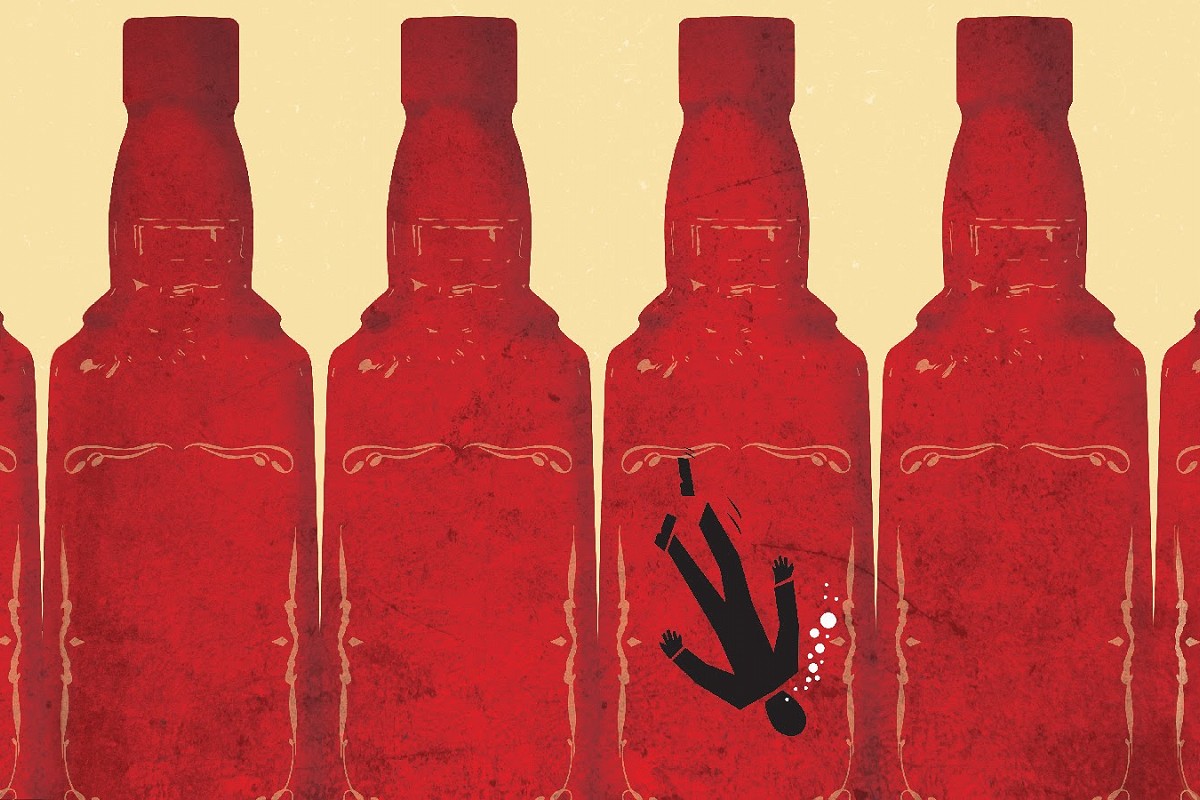How To Tell If You Have a Drinking Problem
by Michael Walsh

Message in a Bottle
Do I have a drinking problem?
Evaluating your relationship to alcohol with radical honesty, self-empowerment, and helpful perspectives. [updated March 2023]
As an experienced Recovery Coach and Interventionist, and as someone who has deep personal experience with alcohol use and misuse, I often get asked, “do you think I have a drinking problem?”
Generally speaking, a drinking problem is the continued choice to drink alcohol despite its repeated negative impact on a person’s life.
While there are some complexities around the question, my first response is usually “If you think you have a drinking problem, you probably have a drinking problem.”
BUT, this doesn’t mean...
you’re an alcoholic
you have a diagnosable condition
your life is going to spiral out of control overnight
It just means there is an issue with alcohol that deserves your attention.
The good news is that if you’re asking this question, you already have some level of awareness about the potential problem alcohol may be causing in your life. And that’s an important step in creating positive change.
So, let's dive in with some steps you can take to figure out if you do in fact have a drinking problem.
Begin with yourself.
As a society, we’re conditioned to want things quickly and easily – coffee with the push of a button, groceries delivered within hours, and robot vacuums to keep our homes clean. And it’s no different when it comes to wanting an answer to the question, “do I have a drinking problem?”
We’re quick to scour the internet for a set of criteria, or an online quiz that will tell us if our drinking habits are “normal”. But, I’m going to ask you to press pause on that initial urge for instant gratification – at least for a moment.
Drinking is a deeply personal experience and everyone’s journey is going to look different. This means that, while it’s tempting to dive headfirst into the online rabbit holes, the best place to start is with yourself. People tend to cringe when they hear this, and I get it –it’s easier to look outside ourselves for answers.
But the truth is, most of us know deep down whether alcohol is serving us or not, and getting in touch with that inner knowing is far more powerful than any online quiz result or clinical definition.
Get really, really honest.
So, start by asking yourself some tough questions, and letting yourself be really really honest when answering them.
- How much time do you spend buying, consuming, and recovering from alcohol?
- How much time do you spend thinking about alcohol?
- How much time do you spend worrying about drinking?
- Have you ever tried to quit drinking before?
- Have you ever tried to moderate your drinking before?
- Have you ever tried to hide your drinking habits from someone?
- What brought you to this page today?
Once you’ve rooted yourself in your own radical honesty, it can be helpful to explore clinical definitions, guidelines and other outside perspectives.
Gather trustworthy perspectives.
What is considered normal or safe drinking?
The National Institute on Alcohol Abuse and Alcoholism (NIAAA) defines low-risk drinking as four or fewer standard drinks on any single day, and fewer than fourteen drinks during any given week— for men. For women, it’s three or fewer standard drinks a day, and no more than seven drinks per week.
For perspective, the NIAAA defines a standard drink as follows:
- 12 ounces (355 milliliters) of beer (about 5% alcohol)
- 8 to 9 ounces (237 to 266 milliliters) of malt liquor (about 7% alcohol)
- 5 ounces (148 milliliters) of wine (about 12% alcohol)
- 1.5 ounces (44 milliliters) of 80-proof hard liquor (about 40% alcohol)
Take some time to honestly think about where your consumption levels fall within these guidelines. Maybe it’s inconsistent for you, and there are weeks that exceed these low-risk levels, and others where you drink nothing at all.
If you’re having a hard time calculating the number of standard drinks you consume in a given week, start a simple consumption journal. Since most of us carry our smartphones around with us 24/7, your phone is usually a sensible place to track this information.
What is considered hazardous or risky drinking?
The Centers for Disease Control and Prevention (CDC) lists two main categories when it comes to risky or hazardous drinking behaviors -- heavy drinking and binge drinking.
Heavy drinking is defined as:
- Women consuming 8+ drinks per week.
- Men consuming 15+ drinks per week.
This will look different depending on your lifestyle, but consider that it’s easy to reach these levels if, for example, wine has become standard with dinner, or you attend frequent social gatherings where alcohol is often present.
Binge drinking is defined as:
- Women consuming 4+ standard drinks, within two hours.
- Men consuming 5+ standard drinks, within two hours.
While it may be a tough pill to swallow, if you’re partaking in drinking that meets the criteria above, even occasionally, you’re putting your physical health (and arguably much more) at risk, and that’s enough to constitute a drinking problem by most people’s standards.
What are the symptoms of alcoholism?
While we still hear the word “alcoholic” and "alcoholism" used in conversation, most health professionals (including myself when appropriate) now use the term Alcohol Use Disorder (AUD).
According to the Mayo Clinic, AUD is “a pattern of alcohol use that involves problems controlling your drinking, being preoccupied with alcohol, continuing to use alcohol even when it causes problems, having to drink more to get the same effect, or having withdrawal symptoms when you rapidly decrease or stop drinking.”
AUD can be mild, moderate, or severe, based on the number of symptoms a person experiences. According to the Mayo Clinic, symptoms include:
- Being unable to limit the amount of alcohol you consume
- Desire to cut down on how much you drink
- Making unsuccessful attempts to moderate your drinking
- Spending a lot of time drinking, getting alcohol, or recovering from alcohol
- Feeling a strong craving or urge to drink alcohol
- Failing to fulfill major obligations at work, school, or home due to alcohol use
You will find endless amounts of information on the internet about alcohol use. While it can be difficult, try not to get overwhelmed or bogged down with information overload. Stay grounded in your own experience, and focus on what’s actually helpful to you, and what’s not.
Trash the labels if they don’t serve you.
Labels and clinical definitions serve a purpose, but can also keep us stuck. This is because alcohol misuse and addiction have become so stigmatized in our society that we end up thinking there are only two kinds of people when it comes to drinking -- “alcoholics” and “normal people”. And if you’re not clinically diagnosed as the first, you should carry on with your drinking <long sigh>.
The truth is that the majority of people who struggle with alcohol are NOT clinically addicted. This idea that we need to be falling down and losing everything before we should start addressing our drinking, is a deeply unhelpful mindset that robs people of their happiness and full potential.
If you worry about your drinking, if it’s causing you shame, or if it’s getting in the way of the life you want to be living – let that be enough to at least keep questioning the role alcohol is playing in your life.
STAY CURIOUS with a holistic approach.
As a Recovery Coach, I meet you where you’re at – whether you’re looking to cut down on how much you drink or quit drinking altogether.
We get curious about the role that alcohol plays in your life using a process of compassionate inquiry and guided self-reflection. We talk about your goals and dreams, and simply consider the ways that alcohol might be impacting them.
Our ultimate goal is never to simply remove alcohol and leave you white-knuckling your way through life. While I believe there are many pathways of recovery, that is not one I promote.
To truly set you free, we focus on why you drink in the first place, and find solutions that help you live comfortably and happily, without the need for alcohol.
Find support that works for YOU.
Every person’s journey with alcohol is going to look a little different, which is why I create individualized support plans that meet you where you’re at.
While 1:1 Recovery Coaching is enough for many clients, I also work closely with psychologists, physicians, intensive outpatient programs (IOP), and inpatient alcohol rehab facilities. And, for those with family members affected by a love one's drinking, I offer training and support using the CRAFT model.
When I say I’ve been there, I really mean it - you can read my story here. Please feel free to reach out to me directly with any questions. I offer a complimentary discovery call to explore the many options you have in finding support. You will also find a number of helpful assessment tools in the resources section of my website. You can also go to my contact page where you'll find a number of ways to reach me.
If you’re ready to explore the potential of working together, I’d love to chat. Michael is based in Victoria British Columbia Canada. The other Recovery Coaches on the team are based in Nanaimo, Vancouver British Columbia Calgary, Edmonton Alberta, Toronto Ontario, Montreal Quebec, and Halifax, Nova Scotia. Because we all work virtually — we can work with anyone no matter what city, province or country around the world. We have clients all across Canada and the USA, Seattle, Los Angeles, Dallas, Miami, New York City, Denver, Nashville, Berlin, Tel Aviv, London, Singapore and Australia.
Phone or Text: 250.896.8494
Email: Coach@MichaelWalsh.com
Chat: Start a WhatsApp chat




